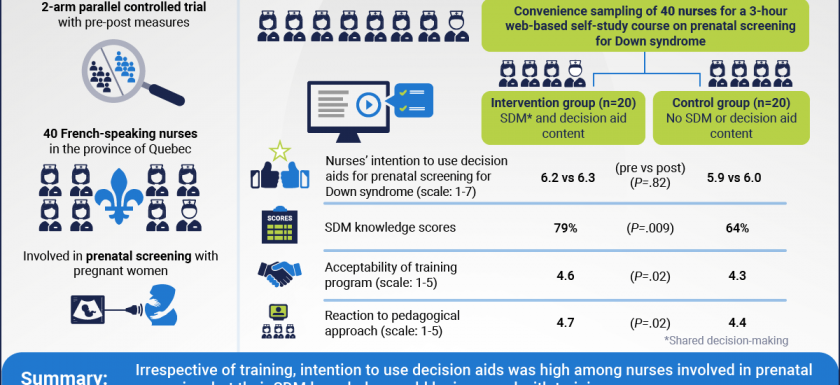
JMIR Publications recently published “Web-Based Training for Nurses on Using a Decision Aid to Support Shared Decision-making About Prenatal Screening: Parallel Controlled Trial” in JMIR Nursing which reported that in this study, these authors aimed to assess the impact of a shared decision-making (SDM) training program on nurses’ intention to use a decision aid with pregnant women deciding on prenatal screening for Down syndrome.
They were allocated by convenience either to the intervention group or to the control group.
After the intervention, the mean score of intention was 6.3 for the intervention group and 6.0 for the control group.
The intervention was significantly more acceptable in the intervention group, and the reaction to the pedagogical approach was also significantly more positive in the intervention group.
It shows that nurses’ intention to use a decision aid to enhance SDM in prenatal care is high, with or without training, but that their knowledge about SDM can be improved with web-based training.
Dr. France Légaré said, “In Quebec, prenatal screening for trisomy 21 (Down syndrome) during prenatal follow-up is offered to all pregnant women as part of the state-run health care services, as well as in a few private clinics.”
SDM improves the health care experiences of both patients and health professionals, and leads to better health care processes, patient experience and outcomes, optimal health spending and a more equitable health care system.
To implement SDM in clinical practice, several approaches have been proposed in the literature, including interactive skills workshops for health professionals and implementation of SDM tools known as decision aids.
Owing to their close and trusting relationship with patients, their intimate understanding of their community environment, their understanding of biology, and their communication skills, nurses could be powerful allies in implementing SDM in prenatal care.
Most SDM implementation studies focus on physicians, but with the transformation of health care systems, nurses are increasingly involved in clinical decision-making, and their crucial role urgently needs acknowledgment.
Moreover, many studies highlight that an interprofessional approach to SDM, in the context of team-based health care, has benefits for SDM implementation.
Dr. Légaré and the research team concluded in their JMIR Publications Research Output that this study focuses on the potential of web-based nursing education to support pregnant women’s decision-making needs.
These authors assessed nurses’ intention to use a decision aid (DA) to support prenatal screening decisions among pregnant women and their overall impressions regarding the training. This study showed that nurses’ intention to use a DA in prenatal care is already high, with or without training, but that their knowledge about SDM could be improved with training. Their results will inform future strategies for implementing SDM behaviors in this population.
The study also suggested avenues for future evaluations of SDM training programs. The next steps will be to update the program by incorporating the written comments received from the participants and evaluate the impact of the course with all health professionals involved in prenatal care.
###
DOI – https://doi.org/10.2196/31380
Full-text – https://nursing.jmir.org/2022/1/e31380
Free Altmetric Report – https://jmir.altmetric.com/details/121554573
Keywords – shared decision-making, prenatal screening, training, nurses, nursing, behavioral intention, trisomy, Down syndrome, continuing professional development, continuing education, medical education, decision aid, screening, prenatal, pediatrics
JMIR Publications is a leading, born-digital, open access publisher of 30+ academic journals and other innovative scientific communication products that focus on the intersection of health and technology. Its flagship journal, the Journal of Medical Internet Research, is the leading digital health journal globally in content breadth and visibility, and it is the largest journal in the medical informatics field.
To learn more about JMIR Publications, please visit https://www.JMIRPublications.com or connect with us via:
YouTube – https://www.youtube.com/c/JMIRPublications
Facebook – https://www.facebook.com/JMedInternetRes
Twitter – https://twitter.com/jmirpub
LinkedIn – https://www.linkedin.com/company/jmir-publications
Instagram – https://www.instagram.com/jmirpub/
Head Office – 130 Queens Quay East, Unit 1100 Toronto, ON, M5A 0P6 Canada
Media Contact – Communications@JMIR.org
The content of this communication is licensed under the terms of the Creative Commons Attribution License (https://creativecommons.org/licenses/by/4.0/), which permits unrestricted use, distribution, and reproduction in any medium, provided the original work, published by JMIR Publications, is properly cited.
JMIR Publications is a registered trademark of JMIR Publications
